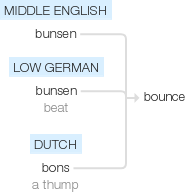Bounce
Middle English bunsen ‘beat, thump’, perhaps imitative, or from Low German bunsen ‘beat’, Dutch bons ‘a thump’.
wiktionary
From Middle English bunsen(“to beat, thump”), perhaps imitative [1]. Compare Low German bunsen(“to beat”), Dutch bonzen(“to thump, knock, throb”), and akin to bonken(“to bang, smash”), and possibly English bang.
etymonline
bounce (v.)
early 13c., bounsen "to thump, hit," of uncertain origin, perhaps from Dutch bonzen "to beat, thump," or Low German bunsen, or imitative. The sense probably has been influenced by bound (v.). In 17c., "to talk big, bluster; bully, scold." Meaning "to bound like a ball" is from 1510s; transitive sense "cause to rebound" is from 1876. Of a check, "be returned for insufficient funds" is from 1927. Related: Bounced; bouncing.
bounce (n.)
1520s, "a heavy blow," also "a leap, a rebound" from bounce (v.). In reference to politicians and public opinion polls, by 1996, American English.
